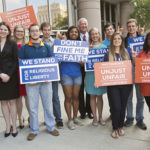WASHINGTON—Legal representatives of 16 states filed a friend-of-the-court brief with the U.S. Supreme Court supporting two Texas Baptist universities and a Pennsylvania seminary in the schools’ challenge to the Health and Human Services mandate of the Affordable Care Act, popularly called “Obamacare.”
Several religious groups—including the Southern Baptist Convention’s Ethics & Religious Liberty Commission and International Mission Board—also filed briefs supporting Houston Baptist University, East Texas Baptist University and Westminster Theological Seminary.
Claim contraceptives cause abortions
The schools object to providing—directly or through a third party—drugs they believe cause abortions. Although a federal judge ruled in the schools’ favor in 2013, the 5th Circuit Court of Appeals ruled against them in June.  The three-member federal panel decided the schools’ religious liberty is not substantially burdened by a requirement they formally opt out of HHS-mandated emergency contraceptive coverage and shift responsibility to a third-party provider.
The three-member federal panel decided the schools’ religious liberty is not substantially burdened by a requirement they formally opt out of HHS-mandated emergency contraceptive coverage and shift responsibility to a third-party provider.
States joining in the brief supporting the schools’ case are Alabama, Arizona, Florida, Georgia, Kansas, Louisiana, Michigan, Montana, Nevada, Ohio, Oklahoma, South Carolina, South Dakota, Texas, Utah and West Virginia.
“The continued assault on religious liberties in our nation threatens every single American and undermines the foundation of our Constitution,” said Texas Attorney General Ken Paxton, who filed the brief. “No government should impose costly fines on its citizens for living in accordance with their convictions, and today the state of Texas stands with all religious institutions seeking protection from the overreaching mandates of Obamacare.”
Brief gives states’ interest in religious liberty
The brief asserts states have a substantial interest in protecting the religious beliefs of nonprofit organizations, and it argues those entities are entitled to the same exemption granted to churches.
“Petitioners share with churches the same religious conviction about providing health insurance without contracting with companies that will then have to pay for drugs regarded as abortifacients,” the brief states.
The brief cites the national Religious Freedom Restoration Act and similar laws in place in 20 states. They prevent government from placing a substantial burden on the free exercise of religion unless it is for a compelling reason and accomplished by the least burdensome means.
The federal government already exempted churches and some other employers from the HHS mandate, “showing its understanding that means less restrictive than the mandate will serve its general interest in promoting access to contraceptives,” the brief says.
Difficult to see ‘compelling interest’
“It is difficult to see any basis for finding a compelling government interest in regulating religious objectors rather than using whatever methods the government deems acceptable for employees of churches and other employers already excluded from the mandate,” the brief states.
The brief also cites Burwell v. Hobby Lobby Stores, which allows closely held for-profit business an exemption to a law to which its owners object on religious grounds, if there is a less-restrictive mean of advancing the law’s interests.
“Hobby Lobby instructs that RFRA’s substantial-burden test does not allow courts to question a religious adherent’s judgment that certain conduct makes the adherent morally complicit and is therefore forbidden to them,” the brief states.
In addition to the brief filed by the 16 state attorneys general and solicitors general, others joining the Southern Baptist agencies in filing legal briefs supporting the schools are the Christian and Missionary Alliance Foundation, the Alliance Community for Retirement Living, Simpson University, Crown College and the 181-member Council of Christian Colleges and Universities.
Lawsuit originally filed in 2012
ETBU and HBU first filed a lawsuit in October 2012, objecting to a requirement that female employees be provided access to all Food and Drug Administration-approved preventive birth-control methods, including emergency contraceptive drugs they assert cause abortions. Final HHS regulations include an accommodation for faith-based organizations, stipulating they are not required to contract, arrange, pay for or refer for contraceptive coverage they oppose on religious grounds.
However, the schools insisted the self-certification process—in which they would notify the government they were opting out of the provision—would result in employees automatically receiving the drugs through a third-party administrator, and that would make the universities morally complicit in facilitating abortions.
A federal district judge in Houston ruled in the schools’ favor in 2013, saying the mandate violated the universities’ rights guaranteed by the federal RFRA. But the 5th U.S. Circuit Court of Appeals overturned that decision, ruling the self-certification process does not substantially burden the universities but shifts the burden to a third-party administrator, who is reimbursed by the government.
Latest ruling : Burden shifted to ‘third parties’
“Although the plaintiffs have identified several acts that offend their religious beliefs, the acts they are required to perform do not include providing or facilitating access to contraceptives,” the circuit court panel ruled. “Instead, the acts that violate their faith are those of third parties. …
“The plaintiffs’ religious beliefs forbid them from providing or facilitating access to contraceptives, but the requirement that they enter into the contracts does not force them to do so. The acts that violate their faith are the acts of the government, insurers and third-party administrators, but RFRA does not entitle them to block third parties from engaging in conduct with which they disagree.”
The Supreme Court likely will consider petitions in late September or early October. If the petition is granted, the case would be decided before the end of the court’s term next June.















We seek to connect God’s story and God’s people around the world. To learn more about God’s story, click here.
Send comments and feedback to Eric Black, our editor. For comments to be published, please specify “letter to the editor.” Maximum length for publication is 300 words.